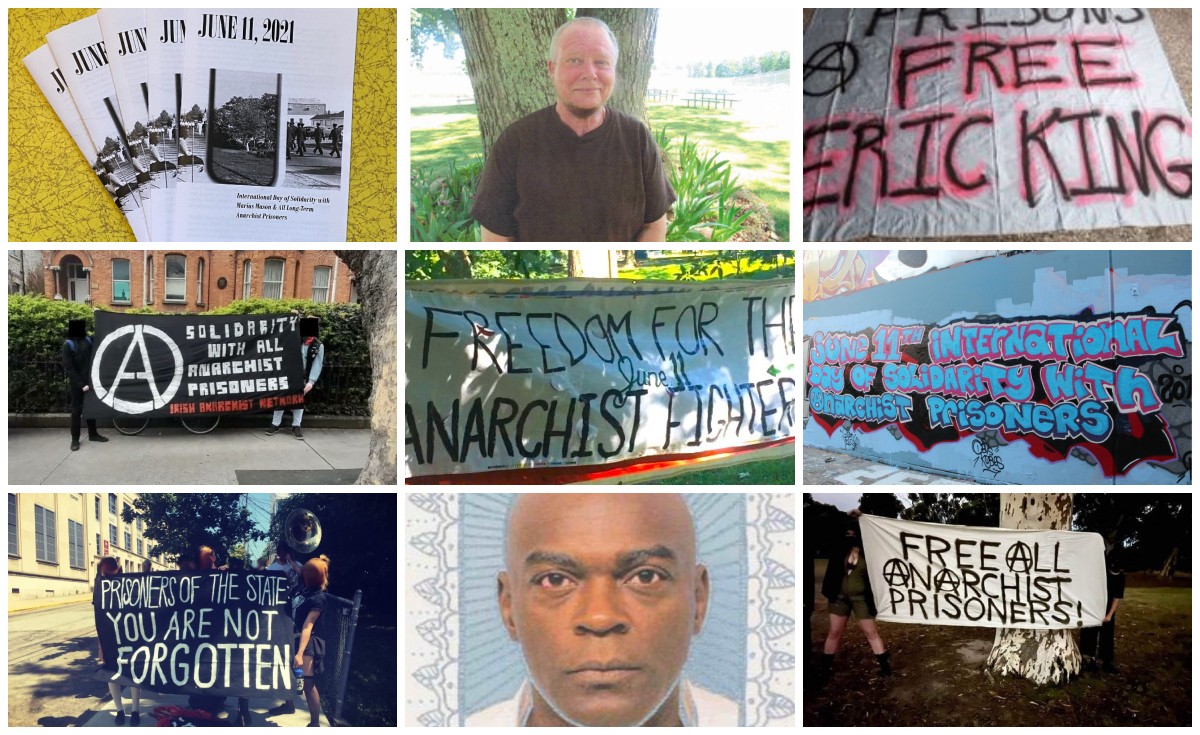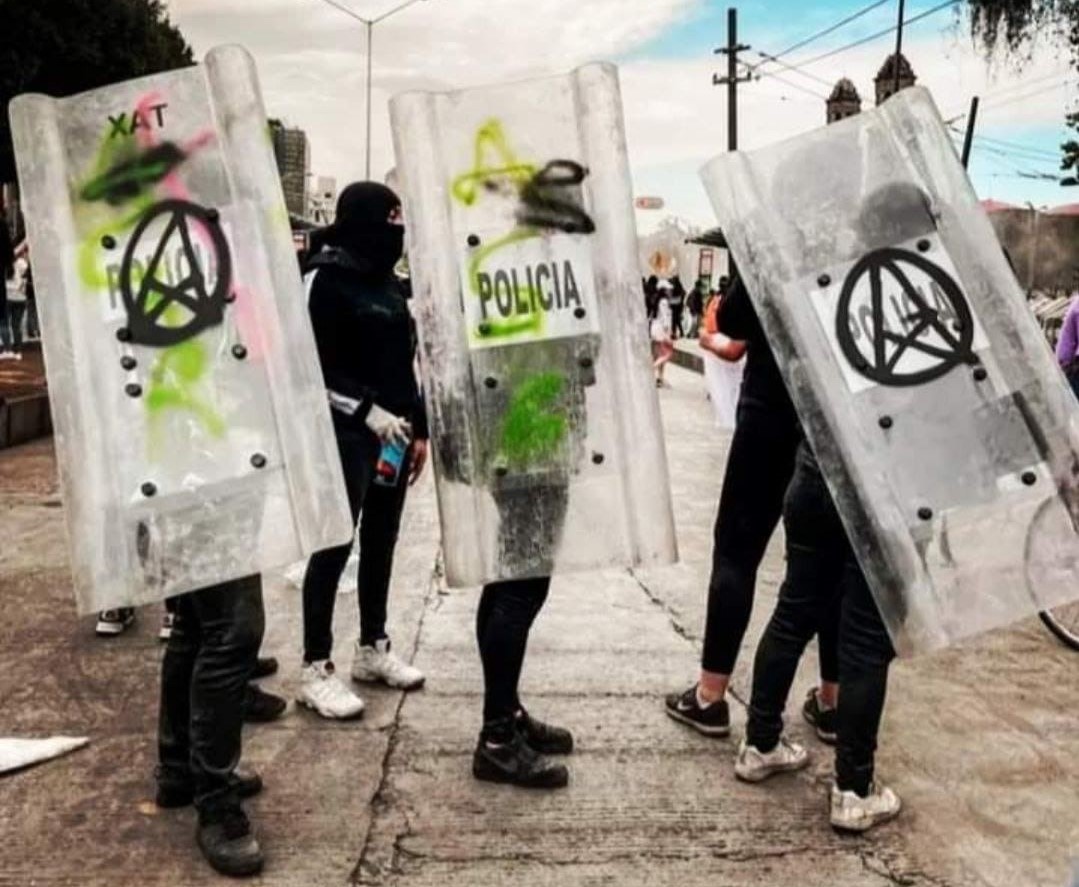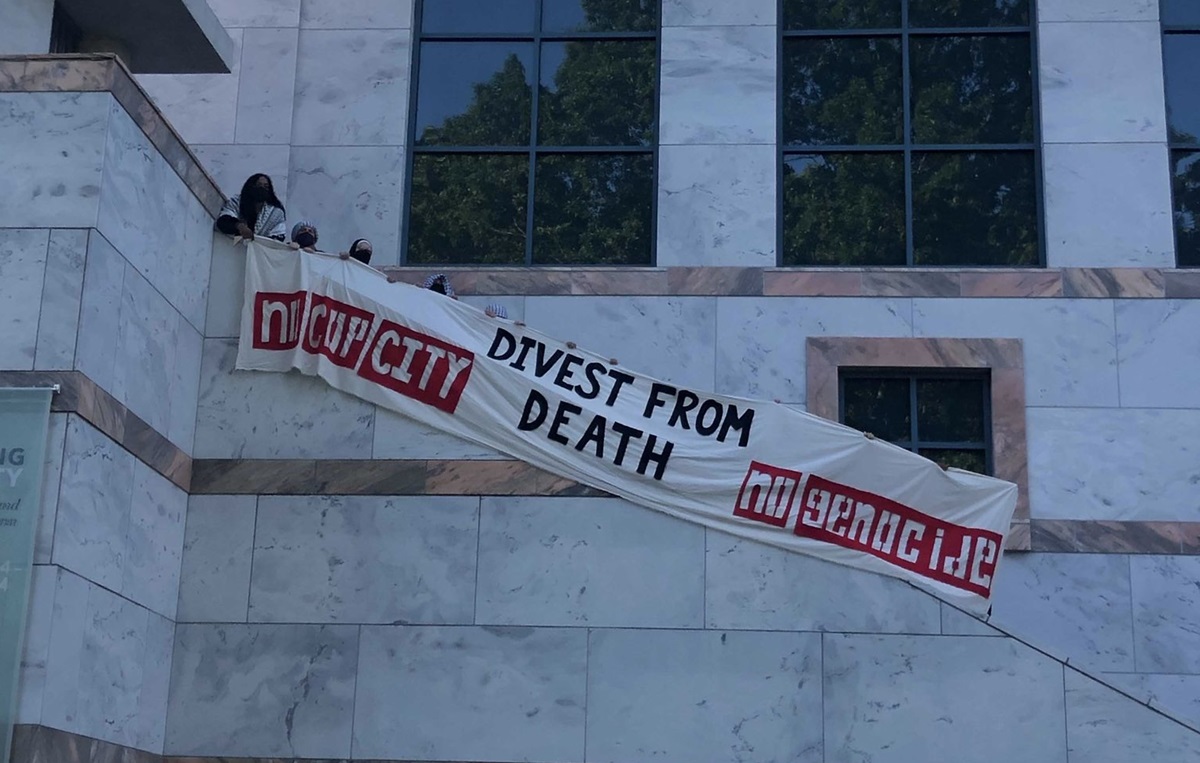Prisoner Updates
Over the last nine years since coming out to friends, family, and supporters as a trans man, Marius Mason has advocated for himself inside the Bureau of Prisons to get his legal name changed, to get access to hormones, and to get transferred to a men’s facility, paving the way for others to do the same. He started the Day of Action & Solidarity with Trans Prisoners. In his message for the Day earlier this year he says, “We are closer to that goal than ever before, as trans prisoners. This year, the Transgender executive Council began meeting again to make decisions about transitioning in the Federal Bureau of Prisons. Several prisoners, both trans men and trans women, were told that they had met the requirements for medical transition and were approved for gender affirming surgeries. I was one of these fortunate few.” We see how precarious these victories are when they are at the whim our our enemies. More than anything, we want him out. This year we take bitter solace in acknowledging that the majority of Marius’s sentence is behind him; he has 8 of 22 years remaining.
Eric King, who has suffered horrific abuse in federal prison, is finally getting out this year. After being acquitted last year on charges of assaulting an officer, he was returned to a supermax where he his access to phone and communication, time out of his cells, and even legal visits are extremely restricted. He and his team recently filed a lawsuit against the prison. As his release fund is getting significant support, Eric and his family continue to be strung along by the BOP, disputing the time and location of his release.
Michael Kimble has been dedicated to building collective power in Alabama DOC, supporting other queer prisoners, participating in collective resistance, and sharing radical history with others, all while healing from multiple injuries with poor medical care. He met someone special inside and got married last year.
Alfredo Cospito has continued to fight the state from prison. Since his initial sentencing for wounding a nuclear executive, and an additional life sentence for other previous actions, he continues to be hounded for his unrepentant anarchism. The latest trial against him and other comrades began in March of this year, many months into his hunger strike against the conditions he is subjected to. The Italian state attempted to bury him in the tyrannically isolated 41 bis dungeons last year, and he began the strike against this “non-life” last October. His health is rapidly deteriorating, and we’re not sure he will survive much longer, but he remains an unrepentant iconoclast inspiring innumerable actions around the world.
Anna Beniamino, Alfredo’s dear comrade and co-defendant during the Scripta Manent trial, also took part in a hunger strike in solidarity with him from her place of imprisonment, but later withdrew to recenter Alfredo’s fight.
Dan Baker, coming up on the end of his 3.5 year sentence, has been facing an onslaught of harassment and abuse. His books and personal items have been confiscated, and his email and phone communication severely restricted, including his ability to communicate with his lawyer, as prison staff are doing all they can to punish Dan for his beliefs. Dan has endured physical assault, the denial of health services, including restricting his access to asthma medication and treatment for a tumor, all as retaliation that seeks to jeopardize both his release date and his housing options post-release.
Legacies of Resistance and Resilience
Marius is a great example of someone who has faced this level of repression before, and did so with dignity, strength, and care. The continuity of his support over the last 15 years is a demonstration and practice of what long-term prisoner support can look like. The refusal of his abandonment by supporters can hopefully give some strength to forest defenders and rebels as they face down the threats if the state. Other Green Scare cases have successful challenged enhancements or lengthy sentences, despite the fear-mongering of the state. Whether charges stick or not, we can try to build a legacy of connection and support for those that act.
As the state continues to lash out against women, queer and trans people; crafting new laws to police our health and well-being, whether in the stripping of our access to abortion, or the governing of our access to live-saving hormones, surgeries and gender-affirming care, we’re reminded that anything that the state grants us, can be easily stripped away, and that our struggles are deeply interconnected, and must always remain so.
Drag shows have become the latest ground for violent confrontation, as we ‘dare’ to gather together. Transphobes continue to stake-out space at university talks, on television, and walking down the street. Abortion clinics are seeing more opposition on the ground after the repeal of Roe vs. Wade. But even as powerful and more visible opposition emerges, so does our capacity to act. Queer spaces are refusing to cancel events, and instead practicing and enacting visions of proactive self-defense. Clandestine actions across so-called North America have targeted fake abortion clinics, as well as churches that spew pro-life and homophobic rhetoric. “Jane’s Revenge”, a nod to the underground network of abortion providers in Chicago in the 70’s, is a reminder that we need not sit idly by and watch as life -saving resources, and our humanity, are stripped away. As terrifying as these times are, it is important to remember that we do not have to give in.
What feels like an undoing of progress can also be seen another way: as the facade lifting, and the violent project that is the state, continuing to reveal itself. The legacies of informal groups like Bash Back, and of course individual queer people (like Michael Kimble, imprisoned for defending himself against a violent racist homophobe) remind us that queer– and transphobia is built into the very framework of the state, and that legacies of autonomy, self-defense and survival outside of the existing resources will always be vital to prioritize. We can stop shaking our fists at power, hoping it meets our demands. Power never cedes itself to demands. What we can do is continue to become adept at tools to protect ourselves; whether that’s honing our ability fight and hold ground, grow skilled in healthcare outside of state infrastructure, and deepening other means to stay anonymous, adept, and as free as possible, as well as exercising our capacity to act.
Despite the terror of prison, Michael Kimble continues to advocate for his own release, has found love and a network of queers inside the prison walls with whom to stand alongside. Jennifer Rose has a history of standing up for herself against prison administrations,participating in collective resistance, and writing and contributing to queer advocacy. Marius has fought inside prison for access to gender-affirming resources, including a transfer to a men’s facility. We should celebrate his hard-earned triumphs, while also remembering that most trans prisoners don’t have access to these things. Its worth celebrating victories, and also important to remember that shifts in our society at large trickle down to prisoners. Changes in the greater “free” world that limit our access to life-saving hormones, queer spaces, name changes and the like, will certainly impact prisoners most severely.
As the state continues to encroach on our autonomy, and as violent policies remain commonplace, we must embrace the reality that all we have to protect us is ourselves. The state, its police and prisons will always enforce boundaries of race, gender, and class. We understand that violence against queer people is still a daily reality for so many, even more-so when it intersects with anti-blackness, racism, xenophobia, and poverty; and as anarchists, we’re never interested in freedom for some; its about freedom for all of us. There will always be risks, and the unfortunate reality of this world is that living openly as ourselves can bring policing, prison, or death. But we can learn from the legacies of resilient and courageous queers, incarcerated and free, to not back down, or live in fear or despair. Let us be strong, fierce, and unwilling to abandon one another.
People have been rising up against the police as long as the police have existed. In the US and around the world, the intensity of anti-police activity ebbs and flows. Again with movements and actions against state violence, against the police, and against police killings of black people, we see the failure of the state’s threats and imprisonment to pacify us. The next round of struggle has already started by the time prisoners from the last round are released. Eric King is just finishing up his 10 year sentence for actions taken in solidarity with the Ferguson Uprising in 2014. Josh Williams, given the longest sentence of anyone arrested at Ferguson protests, is also approaching the end of his sentence. In the last couple years we’ve seen the sentencing of George Floyd uprising prisoners. Malik Muhammad, given one of the longer sentences from 2020, is a couple years into an almost 10-year sentence. Around the world we see militants in France, Chile, Haiti and elsewhere facing down the police. In Russia, we see anarchists attacking not just the police, but military infrastructure. Waves and waves of crowds and individuals continue to decide that, despite the risks, its worth standing up to the police.
Spreading Embers
Many of us know what it is feels like to sink into despair. When the losses add up, and pushing through feels insurmountable. But an integral part of the anarchist spirit is facing that despair head-on, with a determination to burst through it and continue on, fighting. Anarchist prisoners are a prime example of this spirit: they have faced the state head-on, faced the uncertainties of felony trial and state pressure, and remained courageous in the face of repression, as well as the daily dehumanization and violence that occur inside prisons. Their cases can teach us about tactics, approaches, and the case against them can illuminate the arsenal of tools utilized by the state. Rebel prisoners show us what it means to live courage, resiliency and determination.
The terrain of struggle looks wildly different than it did even ten years ago, and we are constantly adapting to a changing context. But our struggles remains interconnected, and they carry on. Sometimes the impact of things feels pointless; intangible. But the reality is that the struggle for freedom is constantly unfolding, and is yet, unwritten. Anonymous actions from across the world remind us, here and now, that we are not alone in our anger at this system, and that is possible to move through fear, anxiety and despair in order to continue to fight. Rebels, known and unknown, illustrate that it is indeed possible to act for our freedom, here and now.
Two tools of the prison system are isolation, and time. Isolation that wears on the spirit of those locked away and time that passes as we on the outside can become distracted by all that grasps for our attention. But we can refuse to allow these approaches the success they seek. We can remind prisoners that they are not forgotten, that their contributions are a part of a continued fight against domination, and in search of total freedom. The stakes are indeed high, and wanting to avoid the atrocities of prison are very understandable. But when we continue to include anarchist prisoners as a important part of our struggle, we pay homage to their contributions, and show that we are not backing down, despite the risks.
Allowing the prison’s tactics of division to be unsuccessful is a small but vital contribution to weakening its totality. When we show that being locked up will not make someone forgotten, we demonstrate that the horror and alienation that prison thrives upon does not have to take root. For every coward that has sold away their friends, lovers, comrades and values for the paltry offerings of security or comfort, there are strong hearts who refuse to abandon their commitments in the face of repression. Let us celebrate their additions, their heart and spirit, and their lives as we refuse to let our passion for freedom be obliterated.
We are here because we refuse to fall victim to despair. Neither will we allow our friends, compas, comrades, or homies to disappear into oblivion. We reach out to them however we can: with letters and visits, with money on their books, by shouting their names in the streets and writing them on walls – while the imprisoned continue with their contributions from the other side. No struggle or its gatherings can occur without others being reminded of those that fought and got locked away – nor those who died.
Not least of all, we carry all of them in our hearts as we carefully proceed through the darkness, continuing our collective fight. This way we keep them close – no one forgotten and not one fiber of this society forgiven. Those intricate strings tying together the means of domination are within reach, and we carry on the efforts to sever every one.
We do not rely on empty slogans, letting anarchy die like a shallow breath exhaled from our tepid mouths. Acting on our desires, we reinvigorate the life blood of our fight time and again. So we continue to breath fire upon the machinations of civilization, and all those attempting to police our revolt. Increasingly isolated, with spreading embers lighting the path to their uncertain footing, we will collapse the pale corpses propped up as dominant edifices above us.
Alfredo reminds us that there is no losing when we choose how we live, and may well vanquish death upon being sown back into the earth.
In the ruins of the old world we will gather as patient swarms, finding those once taken from us standing proudly beside us, and begin to look toward tomorrow.





